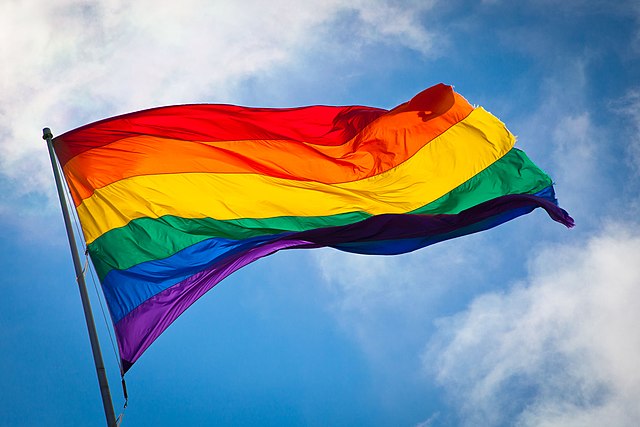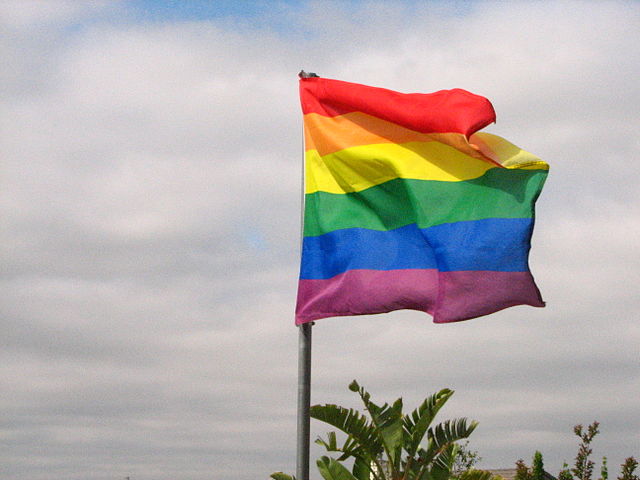
LGBT Pride Month is a month, typically June, dedicated to celebration and commemoration of lesbian, gay, bisexual, and transgender (LGBT) pride, observed in socially progressive nations around the world.
Thammasat University students interested in reading about relevant books to celebrate June as LGBT Pride Month might note that through the generosity of the late Professor Benedict Anderson and Ajarn Charnvit Kasetsiri, the Thammasat University Library has acquired important books of interest for students of Association of Southeast Asian Nations (ASEAN) studies, political science, sociology, and related fields.
They are part of a special bequest of over 2800 books from the personal scholarly library of Professor Benedict Anderson at Cornell University, in addition to the previous donation of books from the library of Professor Anderson at his home in Bangkok. These newly available items will be on the TU Library shelves for the benefit of our students and ajarns. They are shelved in the Charnvit Kasetsiri Room of the Pridi Banomyong Library, Tha Prachan campus.
Among them are books on several different minorities, including several on gender minorities, that should be useful to TU students who are interested in art, cultural studies, European history, sociology, architecture, religious studies, literature, gender studies, and related subjects.

One such study is Christianity, Social Tolerance, and Homosexuality: Gay People in Western Europe from the Beginning of the Christian Era to the Fourteenth Century.
It is a 1980 book about the history of Christianity and homosexuality by the US historian John Boswell.
In his introduction, Boswell discusses previous published research that suffers from an emphasis on negative sanctions which gives a wholly misleading picture of medieval practice, is limited primarily to data regarding France and Britain, and has been superseded even in its major focus, biblical analysis.
Christianity, Social Tolerance, and Homosexuality was praised by historians as an erudite study that provided a revolutionary interpretation of the Western tradition, but some critics noted that his premise that a gay identity and gay people can be found throughout history had been disputed by some readers.
Others argued that Boswell had attempted to whitewash the historic crimes of the Christian Church against gay men.
Another book from the personal library of Professor Anderson of note for students interested in LGBT literature is a novel by the noted African American author James Baldwin.
Giovanni’s Room is a 1956 novel by James Baldwin. The book focuses on the events in the life of an American man living in Paris and his feelings and frustrations with his relationships with other men in his life, particularly an Italian bartender named Giovanni whom he meets at a Parisian bar.
Giovanni’s Room is noteworthy for portraying complex representations of gender expression with empathy and artistry.
A significant theme of Giovanni’s Room is social alienation. Before writing the novel, James Baldwin had recently emigrated to Europe and felt that the effects of racism in the United States would never allow him to be seen simply as a writer.
The novel also explores the topics of origin, identity, nationalism, nostalgia, and related subjects pertinent to today’s identity politics.
According to the website of the Smithsonian Institution, Baldwin was not recognized as an outspoken advocate for gay and lesbian rights, though he was always out himself and supported gender minorities.
At the end of his life, he advocated for gender equality and androgyny.

Baldwin resisted gender-related labels, as he felt that these were determined by white people. In 1984 he told an interviewer:
I feel like a stranger in America from almost every conceivable angle except, oddly enough, as a black person. The word gay has always rubbed me the wrong way. I never understood exactly what is meant by it. I don’t want to sound distant or patronizing because I don’t really feel that. I simply feel it’s a world that has little to do with me, with where I did my growing up. I was never at home in it. Even in my early years in the Village, what I saw of that world absolutely frightened me, bewildered me. I didn’t understand the necessity of all the role playing. And in a way I still don’t. […] I didn’t have a word for it. The only one I had was homosexual and that didn’t quite cover whatever it was I was beginning to feel. Even when I began to realize things about myself, began to suspect who I was and what I was likely to become, it was still very personal, absolutely personal. It was really a matter between me and God. I would have to live the life he had made me to live. I told him quite a long, long time ago there would be two of us at the Mercy Seat. He would not be asking all the questions. […] You see, I am not a member of anything. I joined the church when I was very, very young, and haven’t joined anything since, except for a brief stint in the Socialist Party. I’m a maverick, you know. But that doesn’t mean I don’t feel very strongly for my brothers and sisters. […] Loving anybody and being loved by anybody is a tremendous danger, a tremendous responsibility. Loving of children, raising of children. The terrors homosexuals go through in this society would not be so great if the society itself did not go through so many terrors which it doesn’t want to admit. The discovery of one’s sexual preference doesn’t have to be a trauma. It’s a trauma because it’s such a traumatized society.
Also among the books collected by Professor Anderson were detective and crime novels in which detectives belonged to minorities, including gender minorities.
These include novels by Joseph Hansen, an American crime writer and poet, best known for a series of novels featuring private eye Dave Brandstetter.
Joseph Hansen began his literary career by writing poetry for magazines, including ONE, the first pro-gay publication in the United States. He also hosted a radio show called Homosexuality Today, and helped organize the first Gay Pride Parade in Hollywood.
In 1970, Hansen published Fadeout, his first novel to be published under his own name. The novel also introduces his character Dave Brandstetter, a gay insurance investigator who echoes the tough, no-nonsense personality of the classic hardboiled private investigator protagonist. Brandstetter has been cited as a groundbreaking character in gay fiction and crime fiction. Hansen published eleven further books featuring Brandstetter, some of which were also collected by Professor Anderson.

(All images courtesy of Wikimedia Commons)
